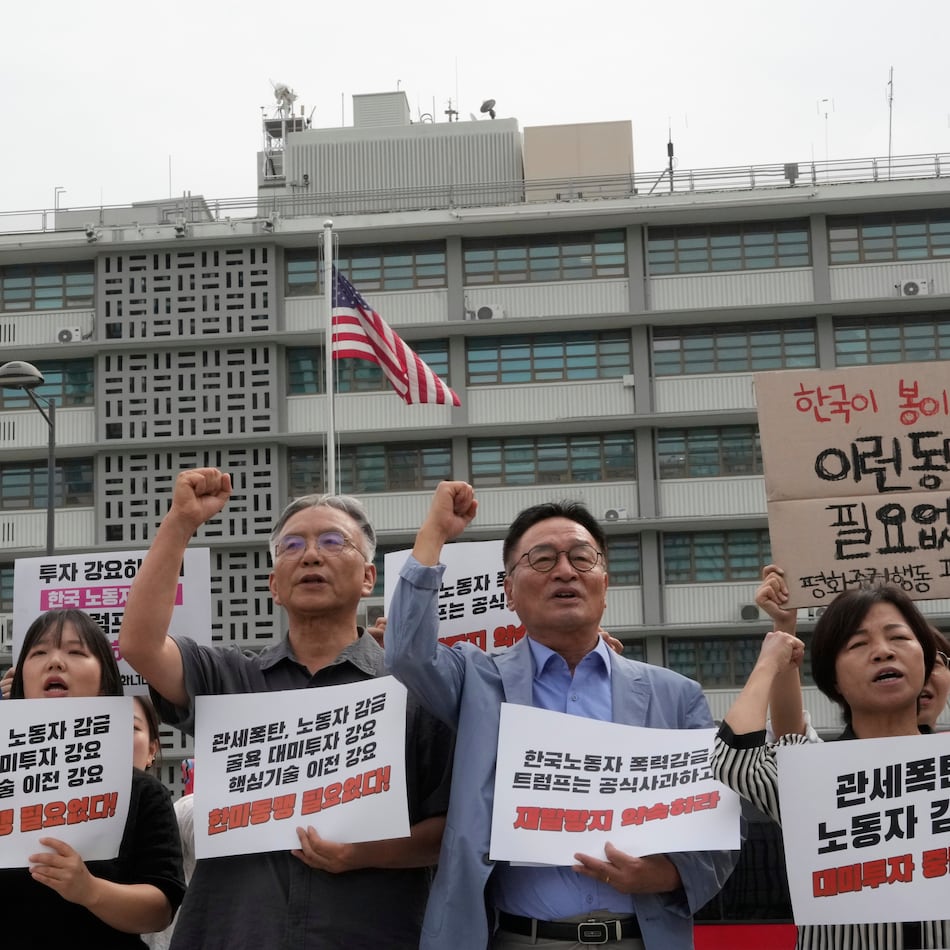Hartsfield-Jackson Atlanta International Airport is the world’s busiest and Delta’s largest hub. But as it looks to a future that could bring through 125 million passengers a year, it is weighing some tough questions about how to accommodate future growth.
Both the airport and Delta are celebrating their centennials this year, and Hartsfield-Jackson General Manager Ricky Smith, who took the helm of the airport in April, is already considering what needs to be done to expand.
“We have to look out to the point where we reach 125, 130, maybe even 140 million passengers, and we have to figure out what the infrastructure needs to look like to accommodate that traffic,” Smith said at a luncheon where he shared the stage with Delta CEO Ed Bastian at an Atlanta Press Club event moderated by The Atlanta Journal-Constitution’s Emma Hurt.
“There’s some difficult decisions that have to be made,” Smith said.
Hartsfield-Jackson has been named the most efficient airport in the world by the Air Transport Research Society, but Smith acknowledged that “to some customers, the airport doesn’t always feel efficient, right?”
“We’re at a point now where pretty much all of our major amenities,” including concourses, gate areas, restrooms, security checkpoints and baggage handling, “they’re all stretched,” Smith said. “And that’s at 108, 110 million passengers.”
Credit: Emma Hurt
Credit: Emma Hurt
“We talk about 125 million passengers. A lot of stuff is going to break before we get there,” Smith said. “We have to take a serious effort around planning. … Otherwise we’re going to find ourselves in a situation (where) … we will not be able to support the growth that Delta and others want at the airport. And that won’t be good for the region.”
The airport is currently a hive of construction activity, with a $1.4 billion expansion of Concourse D, parking upgrades and improvements to the Plane Train among the projects currently underway.
Bastian said Delta is also “very focused on improving the overall customer experience.”
“It’s a great transit hub,” he said, adding that it can be a “better welcoming location as well.” Among the plans are improving the baggage handling system and eventually putting a luxury Delta One Lounge in Atlanta, he said.
A single airport in Atlanta
Travelers in metro Atlanta have long asked why Atlanta doesn’t have a second commercial airport, as many other major cities around the country do.
When asked during the discussion about the idea of a second airport, Smith demurred.
“To try and predict what we’re going to need 25, 30 years from now, in terms of another airport, I personally, I think that’s a premature discussion,” Smith said. “We can figure out what we need to do in terms of accommodating capacity on the existing campus, the idea of another airport right now, I think this is a premature discussion.”
Bastian more emphatically said the airport has a “modular design that creates a lot of additional capability for growth.”
There are plans to build a Concourse G in the airport’s master plan.
“There’s not a city in this country that wouldn’t die to have in its backyard Hartsfield-Jackson and the capability,” he said.
Delta has long opposed the idea of a second airport, that would compete with its largest hub.
While a second airport may help “a smaller subset, maybe in the north or the west or some other part of the region, it’s just going to divert some traffic flows for a very low-end purpose,” Bastian said.
He said continuing to invest in a “faster, larger, more economically-responsible model for the future is why I think a single airport in Atlanta has not only been one of the keys to our success, it’s going to be vital to this future.”
Future needs
This year, passenger traffic is down slightly for the year-to-date, amid a broader softness in travel demand, including in some markets for international travel to the U.S.
Smith said he’s concerned about how politics is affecting international travel. But, he added, “the economy is cyclical. … It always comes back. International travel will come back.”
Credit: JOHN SPINK / AJC
Credit: JOHN SPINK / AJC
Bastian said some markets in Canada have seen a decline in travel to the U.S. But, “we just finished the incredibly busy summer season. … I know our future is international.”
And looking forward, Bastian said the most important thing that needs to be fixed is the nation’s antiquated air traffic control system.
Because of air traffic control delays, the scheduled time for a Delta flight from Atlanta to New York is longer now than it was in the 1950s when Delta started service on the route, according to Bastian.
“When you think about all the modern technology that’s been applied on our side, to say that it takes longer to get to LaGuardia than it did in the 1950s is insane,” he said.
About the Author
Keep Reading
The Latest
Featured




